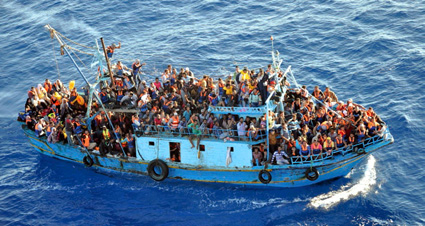|

SPEAKING
at a high-level Dialogue on Protection at
Sea, held by the United Nations High Commissioner
for Refugees (UNHCR) in Geneva, the leader
of the International Chamber of Shipping
(ICS) called on governments to address the
growing refugee and migrant crisis in the
Mediterranean.
"The
shipping industry fully accepts its humanitarian
obligation to assist anyone at sea whose
vessel is in distress. But the situation
in the Mediterranean has been spiralling
out of control, and may well get worse after
the end of winter weather as thousands more
people may attempt to get to Europe from
North Africa by sea," said ICS Secretary
General Peter Hinchliffe.
ICS,
the global trade association for shipowners,
says the crisis has already required over
600 merchant ships to rescue tens of thousands
of migrants during the past 12 months, as
people attempt to get to Europe in dilapidated
craft that are unfit for purpose, not seaworthy,
and often grossly overloaded.
Large
scale rescues at sea are not routine events
and pose enormous challenges to ships that
may only have accommodation and resources
for a crew of 25 people. Recovering 200
or sometimes even 400 anxious and distressed
people on board a merchant ship, and administering
to their immediate needs, places huge demands
on the crew and there is a compelling need
for governments to ensure disembarkation
as soon as possible to a place of safety
ashore.
The
shipping industry is not in a position to
solve the root causes of the crisis and
recognises that governments face an enormous
challenge. "But far more can be done
by governments to ameliorate the current
desperate situation at sea in the Mediterranean,"
Mr Hinchliffe said.
Yet
all ships on pain of penalty are required
under UN's Safety of Life at Sea (SOLAS)
Regulation III/17-1 to have plans and procedures
in place to recover casualties from the
sea. Companies with ships operating in areas
where the probability of being involved
in a large scale rescue may be higher than
normal are particularly advised to develop
additional plans and procedures for their
ships.
These
plans should provide procedures for rescuing
large numbers directly from the sea or from
other craft, accommodating and managing
rescued persons on board, managing the security
of the ship with rescued persons on board
and post disembarkation actions.
What's
more, a shipˇ¦s provisions should now include
Personal Protective Equipment (PPE) face
masks, plastic disease repellent suits,
"sufficient to support small or even
medium scale rescue activities".
But
to support the potential for a large scale
rescue operation, and to avoid excessively
depleting provision and equipment levels
required by shipˇ¦s personnel for the safe
operation of the vessel, it is recommended
that consideration be given to providing
the following additional stores and equipment.
Page 1 2
[Next]
|